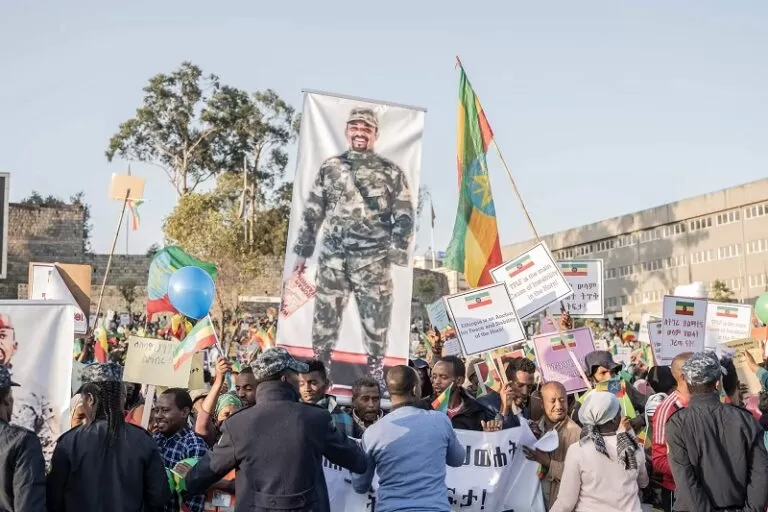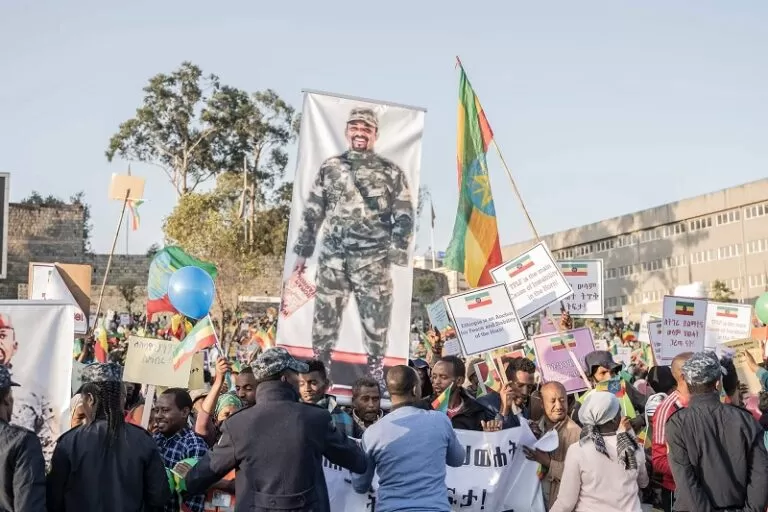

ethiopian peace negotiations over the tigray war resume
Last updated on October 27th, 2022 at 03:30 pm
On Wednesday, representatives from the Ethiopian government and rebels from the Tigray region started their discussions in South Africa with the goal of “finding a peaceful and sustainable solution” to the conflict that has been wreaking havoc in northern Ethiopia for almost two years. According to the South African presidency, these discussions, which are being held under the auspices of the African Union (AU), started on Tuesday in Pretoria. The presidency further specified that they should carry on until Sunday.
Reporters from AFP were able to observe a number of participants entering the Ministry of Foreign Affairs on Wednesday morning in preparation for the continuation of the negotiations. These individuals included former Nigerian President Olusegun Obasanjo and former Kenyan President Uhuru Kenyatta. The media is being kept at a distance, and no information has been shared about what was talked about in the meetings.
On Tuesday, the chairperson of the African Union Commission, Moussa Faki, expressed his satisfaction with the efforts being made to “quiet the weapons towards a united, stable, peaceful and resilient Ethiopia.” Since November 2020, Tigrayan rebels and the federal army backed by forces from neighboring Ethiopian regions and the army of Eritrea, which borders Tigray, have been fighting in a deadly conflict that has plunged northern Ethiopia into a serious humanitarian crisis. This conflict has been blamed for the displacement of hundreds of thousands of people.
The ceasefire that had been in place for the previous five months came to an end in August. Recently, it was declared by Ethiopian and Eritrean forces that they had taken control of many towns, including Shire, which is one of the most important ones in Tigray. The United Nations is highly concerned about the recent outbreak of violence, which is preventing help from being delivered to a region that is home to six million people. For the sake of your own people, the United Nations High Commissioner for Refugees, Filippo Grandi, pleaded with the opposing parties “in order to clear the way for peaceful coexistence.”
Antony Blinken, the chief diplomat for the United States, issued a request to all of the parties involved to “Take these conversations seriously if you want to find a way to end the conflict in a way that is sustainable.” Mike Hammer, the envoy for the United States government, claimed to be present.
The two groups will hold their first public conversation at the meeting that will take place in Pretoria. An official from the West has stated that prior covert meetings, which were arranged by the United States and took place in Djibouti and the Seychelles twice, have occurred. Obasanjo, who is the African Union’s representative in the Horn of Africa, and Kenyatta are on the mediation team. Phumzile Mlambo-Ngcuka, who was the vice president of South Africa before, is also on the team.
While pro-government forces have recently increased their onslaught in Tigray, Ethiopian Prime Minister Abiy Ahmed declared a week ago that the war would “end and peace will prevail” without mentioning the negotiations that were taking place at the same time. On Sunday night, a rebel spokesman posted on Twitter a reminder of what they wanted, which included an “immediate end to hostilities,” “unhindered access for humanitarian workers,” and “the removal of Eritrean forces.”
On Monday, their leader, Debretsion Gebremichael, adopted a more combative tone, pledging that they would continue to “The combined hostile troops that had entered Tigray were going to be obliterated. In November of 2020, Mr. Abiy ordered the deployment of the army into Tigray in an effort to oust regional authorities from the Tigray People’s Liberation Front (TPLF). These authorities posed a threat to Mr. Abiy’s authority and were accused by Mr. Abiy of attacking military bases. This action sparked the outbreak of war.
Before Mr. Abiy came to power in 2018 and pushed them aside, the TPLF had ruled Ethiopia’s ruling coalition for decades and was the dominant force inside it. It is unknown how many lives have been lost as a result of the fight, which has taken place mostly behind closed doors. As a result, independent verification of information is difficult to achieve.
On Friday, the United States Ambassador to the United Nations, Linda Thomas-Greenfield, provided an estimate that in two years’ time, “There may have been as many as 500,000 fatalities. According to the United Nations, the war has also resulted in the displacement of more than two million Ethiopians and has brought hundreds of thousands of people to the brink of hunger. Allegations have been made on both sides of the war that they have committed atrocities against civilians.”
Expansion in the global rare earth industry makes Africa stand out by predicting this region will reach 10% market supply…
Exxaro Resources Limited chose Ben Magara to lead the company as CEO starting April 1, 2025. The firm conducted an…
The National Treasury reduced the VAT tax increase to end the government coalition conflict in South Africa. The Finance Minister…
The International Finance Corporation (IFC) enabled South African green building growth by giving $250 million to Standard Bank for an…
Tom Fletcher as UN Under-Secretary-General for Humanitarian Affairs and Emergency Relief Coordinator describes the UAE as a committed and creative…
A bus crashed on Tuesday near OR Tambo International Airport leaving twelve people dead and injuring forty-five others. First responders…
This website uses cookies.